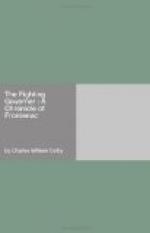More important by far than this argument over precedence was the dispute concerning the organization of parishes. Here the issue hinged on questions of fact rather than of theory. Beyond question the habitants were entitled to have priests living permanently in their midst, as soon as conditions should warrant it. But had the time come when a parish system could be created? Laval’s opinion may be inferred from the fact that in 1675, sixteen years after his arrival in Canada, only one priest lived throughout the year among his own people. This was the Abbe de Bernieres, cure of Notre Dame at Quebec. In 1678 two more parishes received permanent incumbents—Port Royal and La Durantaye. Even so, it was a small number for the whole colony.
Frontenac maintained that Laval was unwilling to create a normal system of parishes because thereby his personal power would be reduced. As long as the cures were not permanently stationed they remained in complete dependence on the bishop. All the funds provided for the secular clergy passed through his hands. If he wished to keep for the Seminary money which ought to go to the parishes, the habitants were helpless. It was ridiculous to pamper the Seminary at the expense of the colonists. It was worse than ridiculous that the French themselves should go without religious care because the Jesuits chose to give prior attention to the souls of the savage.
Laval’s argument in reply was that the time had not yet come for the creation of parishes on a large scale. Doubtless it would prove possible in the future to have churches and a parochial system of the normal type. Meanwhile, in view of the general poverty it was desirable that all the resources of the Church should be conserved. To this end the habitants were being cared for by itinerant priests at much less expense than would be entailed by fixing on each parish the support of its cure.
Here, as in all these contests, a mixture of motives is evident. There is no reason to doubt Frontenac’s sincerity in stating that the missions and the Seminary absorbed funds of the Church which would be better employed in ministration to the settlers. At the same time, it was for him a not unpleasant exercise to support a policy which would have the incidental effect of narrowing the bishop’s power. After some three years of controversy the king, as usual, stepped in to settle the matter. By an edict of May 1679 he ordained that the priests should live in their parishes and have the free disposition of the tithes which had been established under an order of 1667. Thus on the subject of the cures Frontenac’s views were officially accepted; but his victory was rendered more nominal than real by the unwillingness or inability of the habitants to supply sufficient funds for the support of a resident priesthood.




